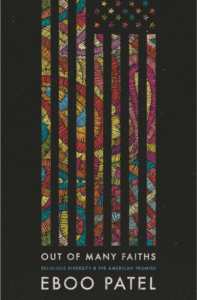 This month, we’re reading Out of Many Faiths: Religious Diversity and the American Promise by Eboo Patel, founder of Interfaith America, which is one of our partner organizations in the Team Up initiative and an ongoing supporter of Pikes Peak Habitat’s work. (Check out this video they created spotlighting our Faith in Action Program Manager Chloe Henry as part of their United We Build mini-documentary series!)
This month, we’re reading Out of Many Faiths: Religious Diversity and the American Promise by Eboo Patel, founder of Interfaith America, which is one of our partner organizations in the Team Up initiative and an ongoing supporter of Pikes Peak Habitat’s work. (Check out this video they created spotlighting our Faith in Action Program Manager Chloe Henry as part of their United We Build mini-documentary series!)
Patel writes as an American Muslim, seeking to define a national identity that embraces and benefits from religious diversity. He presents his ideas, then the book concludes with three essays in response by other thinkers.
These questions are designed to help you engage with the book, either individually or with a group! We’d love to hear your thoughts in the comments section.
Eboo Patel’s Chapters
- What role do you think religion has played, and continues to play, in what Patel describes as a “fraying of the bonds of citizenship” that “imperils democracy itself” (xii)? If you hold religious or spiritual views, how do they inform your participation as a citizen and the way you engage with other citizens?
- What common ground do you identify with other Americans, no matter their religious traditions? Where might you differ in your idea of a common good?
- How does Patel understand neighbors? How is his definition similar to or different from yours? How does your faith tradition define neighborliness? What’s a concrete example of how that looks in your life?
- Patel asks, “What will it take for the American experiment to thrive in the twenty-first century?” (p. 7). How does he answer this question? How is your answer similar to or different from his?
- How does he explain the difference between diversity and pluralism? Why does this difference matter?
- What strengths and weaknesses does Patel identify in the United States as a religiously diverse democracy? Where does he find hope for the future? Do you agree or disagree with his vision? Why?
- Patel points out that “Discrimination against a minority group in a democratic society is not just a violation of their dignity, it is a barrier to their contribution” (60). What examples does he provide of how minority religious groups have contributed or been prevented from contributing to American society? What examples can you think of from your own experience or in your community?
- How does Patel view a “civil religion narrative” as a way to bridge diverse religious identities? What are your thoughts on this claim?
- A recurring question he explores is what it means to be American and what it means to be a member of a particular religious community or tradition. How would you answer these questions? How do you understand American identity? If you belong to a religious tradition, what identifies you as a member of this faith?
Commentaries
“Pluralism after White Christian America” by Robert P. Jones
- Jones says, “Anxieties and resistance stem not primarily from increasing diversity but rather from a sense of displacement among significant numbers of white Christians as they realize they no longer enjoy majority status” (120). What’s your reaction to this statement? How can you help build bridges between people on differing sides of this divide?
- On p. 123, Jones addresses differences in perception and vision between Democrats and Republicans in the United States. What do you think accounts for these differences? Do you think it’s possible to establish a national identity with such conflicting ideas, and if so, how?
- What does Jones propose as an alternative to Patel’s idea of a civil religion? Do you find this more or less viable as a suggestion for developing a pluralistic national identity?
“Hope without a Common Good” by John Inazu
- Inazu says Patel is too optimistic about Americans’ sense of a common good. Do you agree or disagree with this statement? Why?
- He also says we lack adequate legal protections “to live together in spite of our differences” (p. 122). Can you think of examples that support or challenge this statement?
- Inazu points out that a weakness in Patel’s idea of civil religion is that an increasing number of Americans don’t identify with any religious tradition, and “those who identify as nonbelievers may soon dwarf whatever differences separate religious believers from one another” (p. 135). What’s your reaction to this statement? What do you think of his example that people who don’t follow a religious tradition may ask for excused holidays for secular celebrations? How else might lack of religious identity complicate or challenge the role of religion in the public arena?
- He notes that Americans often don’t agree on an idea of the common good. Can you think of anything that most Americans would view as common good?
“Plural America Needs Myths” by Laurie L. Patton
- Why are myths so important in forming a national identity?
- Patton references the myth of the Four Chaplains. What is the story, and what purposes did it serve during the era in which it was popularized?
- Patton suggests some examples of interfaith narratives that could serve as national myths. Can you think of additional stories of what she terms “pragmatic pluralism”? Why are these stories meaningful in showing the benefit of pluralistic cooperation?
After reading all of the essays in this book, has your definition of an American changed, and if so, how? What principles, ideals, commitments, privileges, and responsibilities do you think this identity does — or should — entail?

